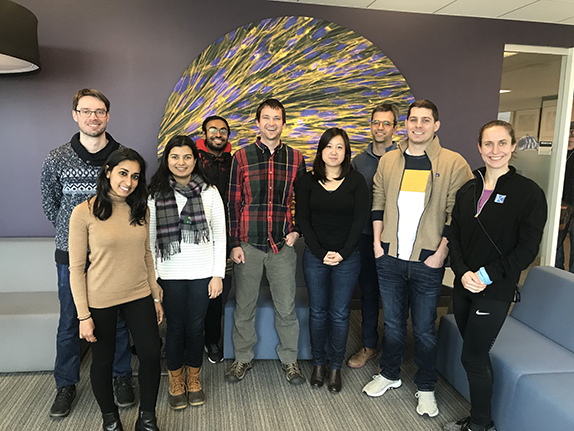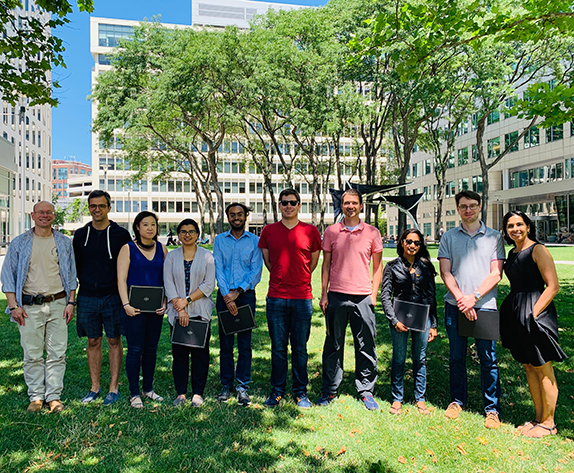Designing and Leading Creative Labs
For more than a decade I have been excited about leading my own laboratory at the interface between basic biology and therapeutics. Along the way, I became increasingly aware that in addition to pursuing exiting research, publishing and presenting your science, collaborating effectively with others and many of the well-known key features of an academic career, there were other less-talked about skills that are equally critical. In a time when students starting their PhD studies are at increased odds of suffering from mental health difficulties1,2, formal training in leadership, mentoring or how to create a healthy and inclusive lab culture is more critical than ever before. That’s why I was very excited to hear that the MIT Center for Precision Cancer Medicine (CPCM) was going to be part of the Convergence Scholar Program (CSP) and even more excited when I heard I was selected to be a part of the first cohort of CPCM scholars. As I am nearing the end of my postdoc what excites me the most is continuing to meet colleagues and collaborate with others, as well as get trained into how to lead a creative and diverse lab moving forward. I saw CSP as an opportunity to learn these skills, and yet I got so much more - collaborators, friends and mentors.
As part of CSP, I attended the 2019 UCSF “Scientific Leadership and Management Skills” course where through MBTI assessment, case assessments and theoretical and practical sessions, I dived deeper into my own strengths and weaknesses to approach different situations and people that are both similar and different from me. This was a fantastic addition to complementary courses that I have taken in the past, such as the Cold Spring Harbor Workshop on Leadership in Bioscience, and books that I have read on the topic3–6. At least if I fail at creating an awesome lab environment I won’t be able to blame it on not knowing the theory! :)

At the MIT Leadership Workshop with my fellow Convergence Scholars.
Since my research program will be highly translational, another part of the program that I benefitted from was to participate in the Tufts/Pfizer Oncology Drug Discovery Workshop. The workshop gave me a new perspective and appreciation for how drug discovery pipelines are developed and decided upon by pharmaceutical companies. This perspective is rarely available to academic postdoctoral fellows like me and it gave me a new appreciation to how translational research leads to therapeutic products and how someone from academia may contribute to that process.
The third part also critical to highlight is the great opportunity to meet all the other CSP scholars. When attending the group CSP events, like the branding and communication workshop, the leadership workshop and the different networking events with donors or government representatives, I kept learning at least as much from the other scholars as I did from the sessions themselves. I trusted some of them so much as external feedback partners, that I knew I could ask them for radical candor7 and I would get their honest opinion on both scientific and non-scientific issues alike. In fact, this has been such a bonding experience that I am working and plan to continue collaborating in the future with another scholar… stay tuned… :)
Finally, I would like to stress the energy and passion that Leny and Tarek, the program coordinators, infuse in the program. An extremely helpful aspect of the program has been able to have career discussions with Tarek and, in my case, in particular with Leny. Leny has become a trusted feedback partner from day one and has continued to shape how CSP has played such a tremendous role in my transition towards leading my own laboratory. I really hope that the promise that Tarek and Leny made that we will all stay connected will become a reality.

One last group picture after the graduation lunch.
1. Evans, T. M., Bira, L., Gastelum, J. B., Weiss, L. T. & Vanderford, N. L. Evidence for a mental health crisis in graduate education. Nat. Biotechnol. (2018). doi:10.1038/nbt.4089
2. Being a PhD student shouldn’t be bad for your health. Nature (2019). doi:10.1038/d41586-019-01492-0
3. Ross, L. et al. Making the Right Moves: A Practical Guide to Scientifıc Management for Making the. Genetics (2013). doi:10.1016/j.virol.2008.10.026
4. Cohen, C. M. & Cohen, S. L. Lab dynamics : management skills for scientists. (Cold Spring Harbor Laboratory Press, 2005).
5. Knapp, J. & Zeratsky, J. Make Time: How to focus on what matters every day. (Transworld, 2018).
6. Catmull, E. & Wallace, A. Creativity, Inc. : overcoming the unseen forces that stand in the way of true inspiration. (2014).
7. Scott, K. Radical Candor — The Surprising Secret to Being a Good Boss. First Round (2016).
